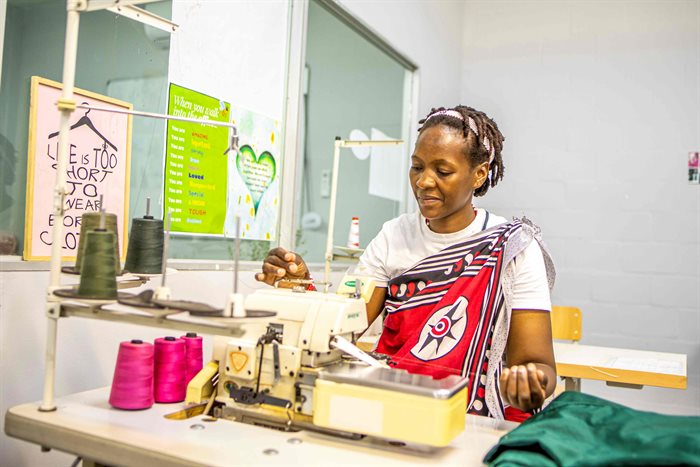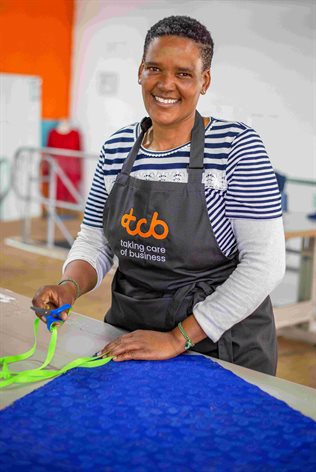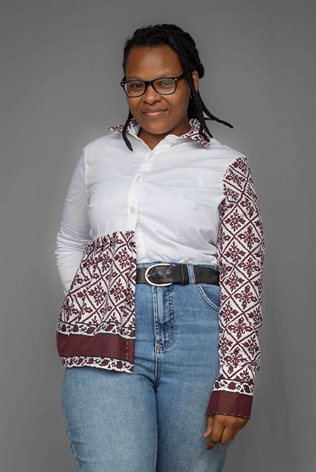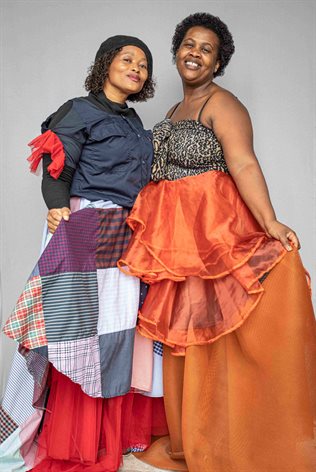
Zandiswas Blayi
The global Fashion Revolution Movement now operates in over 75 countries, proving that ethical and sustainable practices in the fashion industry are critically important. Locally, Fashion Revolution South Africa focuses on reviving the textile and garment manufacturing sector to create dignified work and contribute towards economic growth and development. The Fashion Revolution Week is an annual campaign that forms part of this global movement.
The Fashion Revolution Week takes place every year, around the anniversary of the Rana Plaza tragedy, when an 80-storey building housing garment factories collapsed in Bangladesh killing more than 1100 people. The campaign brings together the largest fashion activism movement with a variety of activations all over the world. Now in its tenth year, Fashion Revolution Week celebrates a decade of activism with 10 days of action, from Monday, 15 April to Wednesday, 24 April.

Nozipho Tyilo

Phatiswa Botya

Philliswa Nkomo and Helen Makasi
This year’s theme - How to be a Fashion Revolutionary – shows that the significance of this global campaign and movement cannot be understated. Especially in our local context with the looming presence of fast fashion giants like TEMU and Shein aggressively targeting South African price-sensitive and fashion-loving consumers. Fashion Revolution Week's call to action urges every individual and organisation to contribute to a fashion industry that respects our natural resources and the people who make our clothes; encouraging us to ‘be curious, find out and do something’.
Fashion Revolution South Africa has put together a variety of events across the country you can get involved in:
1. Sign the Fashion Revolution Manifesto https://www.fashionrevolution.org/manifesto/
2. Take up ‘The Joyful Closet Consumption Challenge’, a year-long experiment backed by a free online system that includes instructional videos, interactive discussion forums, practical exercises, and curated resources. The goal of the challenge is to improve your connection to your clothes and rethink consumption patterns towards more conscious options, while having fun! https://themindfuldresser.com/the-joyful-closet-challenge/
3. Download and use the Fashion Revolution posters (available in 11 official languages) from their website and share it across your work spaces and social platforms. https://drive.google.com/drive/folders/1qpKht06bjfTMRqyxD0g5MfNLW4y36QEk
4. Attend local events taking place from 15 to 24 April in Cape Town and Johannesburg, including film screenings, a Slow Fashion Festival, a Mend in Public Day, and a Clothing Swap. https://fashion-revolution-south-africa-144242194.hubspotpagebuilder.eu/fashion-revolution-week-2024
5. Volunteer with Fashion Revolution South Africa and be a part of the world’s largest fashion activism movement. https://docs.google.com/forms/d/e/1FAIpQLSf0hfir0W53EP73rZLQPbzQebPJhwf21jpG6-1KtlXR1tyODg/viewform?usp=sf_link
6. Ask a seamstress to mend or revive your clothing. That favourite pair of jeans that tore, that shirt that doesn't "sit right," and that dress with boring sleeves - a local seamstress can help you jazz them up and revive them! This will support local employment while extending the life of your clothing items.
7. Don’t want to wear it anymore? Donate your gently worn clothing to social-impact organisations like Taking Care of Business that trains unemployed mothers to buy and sell clothing and become financially independent.
Local success story: TCB plays its part in a circular fashion economy
Since its establishment in 2010, Taking Care of Business (TCB)’s mission has been eradicating poverty in South African families. The organisation runs various training and development initiatives to empower unemployed South Africans to be self-employed while promoting sustainability within the circular economy, especially in the fashion industry. To date, TCB has empowered over 7,000 unemployed men and women and diverted over 20 million fashion, homeware and appliance items from landfills.
TCB’s Remake programme is a 12-month enterprise development initiative that gives local seamstresses tools and resources to establish micro-manufacturing businesses using repurposed clothing and textile waste. Currently, the Remake programme has 72 participants based in Cape Town and will expand to Durban in 2025.
Tracey Gilmore, TCB’s COO, says, "Fashion Revolution Week calls on each of us to play our part. We need to imagine a new fashion future – one that is sustainable and honours local producers. Our Remake programme is not the full solution to the fast fashion crisis but we are playing our part and we ask everyone to do the same. Economic mobility and dignified work opportunities should not come at the expense of sustainability. When we create self-employment opportunities, we must consider the costs and benefits to people, their communities and our planet’s finite resources.”
Collaborations to drive impact
TCB's collaborations with local fashion retailers like TFG, Truworths, Woolworths and MRP Group, which donate their end-of-season and customer returns to TCB instead of sending them to landfill, showcases the power of partnerships. By reselling, reusing, repairing and repurposing fashion items into new products, TCB not only reduces fashion waste but also cultivates a culture of conscious consumption.
Abigail Masholoko, a seamstress in the Remake programme, says, “The clothes that are donated to us, inspire me. Some people may see rejected or broken clothes but I see what these items could become! Those clothes can be changed into something else, a skirt can become trousers and trousers can be transformed into a skirt, a bag or a pot plant cover. There are many things that can be made from old clothes.”
The five R's of sustainable fashion: Everyone has a role to play
Gilmore says, "At the heart of the fashion revolution should lie the principles of the five R’s: refusing, reducing, re-wearing, repurposing, and recycling. These pillars offer practical solutions for consumers to adopt in their daily lives to minimise their environmental footprint. By embracing the five R's of sustainable fashion, individuals can contribute to building a more ethical and sustainable fashion industry, one garment at a time. Through collective action and collaboration, we can redefine South Africa's fashion industry, creating a future where prosperity is shared and the planet is protected,” she says.
“From seamstresses in the informal economy to retailers and consumers, everyone has a role to play in shaping a more equitable, inclusive, and sustainable fashion ecosystem.”



































